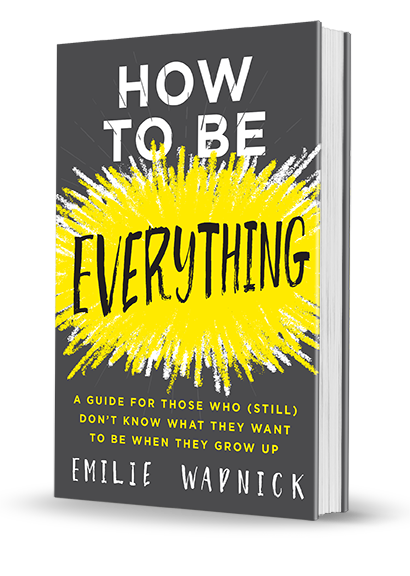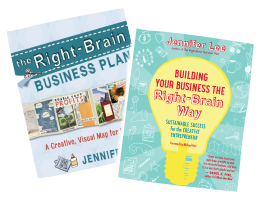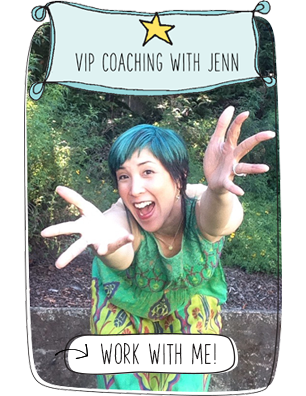
My friend Emilie Wapnick’s new book comes out TODAY May 2nd. It’s just the thing for you if you have multiple passions and aren’t sure how to make it work. In Part 2 of my interview with Emilie she talks to us about productivity hacks for multipotentialites, how to get over Imposter Syndrome, and how to lead with your gifts. You can check out Part 1 here to learn about her four multipotentialite work models.
Emilie’s Interview
Jenn: I hear from many creatives how frustrated they get when they feel like they can’t get anything done because they always have so many ideas and interests. What are a few productivity tips that you can share with us?
Emilie: Here’s my favorite “productivity hack” for multipotentialites:
- Write down all of your passions and projects.
- Pick 1-4 projects that you really want to focus on right now. These are your priority projects. Write them out on a separate page. Hang them on your wall as a reminder, if that helps.
- Make a long list out of all of your other passions and projects. This is your list of projects that are waiting in the wings. Add to this list whenever a new, shiny idea pops into your head.
- When it’s time to get down to work, take a look at your priority projects and pick one to work on. Once you lose steam, take a break and/or switch to another priority project.
- If you’re ever itching to play with some of your projects that are waiting in the wings, take some Tinkering Time. Set a timer for 40 minutes (or whatever length feels appropriate), and have at it. Go down the rabbit hole, explore to your heart’s content, be “unproductive,” have fun! You set a timer, so there’s no risk of losing the whole day.
It’s important that multipotentialites give themselves the freedom to explore, otherwise we can become resentful of our priority projects. At the same time, we want to make progress on our core projects. This technique allows you to balance those two competing needs.
Jenn: It’s quite common in my community of creative entrepreneurs for folks to dabble in a lot of different areas and sometimes this triggers people’s “Imposter Syndrome” fear to kick in. What would you tell someone who is suffering from this limiting belief?
Emilie: Imposter syndrome is a belief that deep down, you are a fraud, that you shouldn’t be here, and that one day everyone will wake up and realize it. Everyone experiences imposter syndrome from time to time, but I think multipotentialites feel it more because we often have unconventional backgrounds or are “outsiders” when we begin exploring something new.
First, know that if you were truly an imposter, you wouldn’t be feeling this way. Imposters are liars, bent on tricking others and profiting from that deceit. Come on, does that really sound like you? True imposters don’t feel imposter syndrome. If you’re feeling a little unsure of yourself, that means that you’re genuine, that you are doing something that matters to you, and that you are maybe stepping out of your comfort zone a little: all good things! Plus really really successful people have talked about experiencing imposter syndrome. I’m talking about folks like John Steinbeck and Jodie Foster. In fact, imposter syndrome might be a sign that you’re doing something very very right.
Beyond realizing that everybody feels this way sometimes, the best way to get past imposter syndrome is to refocus on the work itself. Instead of thinking about how other people perceive you or how well you measure up, just get back to it. Show yourself, through your actions, that you know what you’re doing.
Jenn: It’s so important for us to live from our strengths and as you discuss in the book multipotentialites actually have so many gifts to tap into. What advice do you have for us to lead with our multipotentiality?
Emilie: If you think you might be a multipotentialite, know that there’s nothing wrong with you. In fact, being oriented this way is kind of a super power! Your diverse background and unique skillset can help you stand out in a professional setting and allow you to contribute to the world in refreshingly unique ways.
To lead with your multipotentiality is to embrace and own it. Don’t apologize for having many projects; share those projects with enthusiasm. Design a life that allows you to be the biggest and best multipotentialite you can be. It is absolutely possible to embrace your many passions and having a thriving career at the same time.
Thanks so much for sharing your unique gifts so that we can embrace our puttylike nature. How can we find out more about your work?
Thanks Jenn! You can learn more about my new book at HowtoBeEverything.com. And if you’d like to check out the community and blog, head over to Puttylike.com and say hi!
 Emilie Wapnick is a writer, artist, career coach and community leader. She is the Founder and Creative Director at Puttylike, where she helps multipotentialites (people with many passions, skills, and creative pursuits) integrate all of their interests to create dynamic, fulfilling and fruitful careers and lives.
Emilie Wapnick is a writer, artist, career coach and community leader. She is the Founder and Creative Director at Puttylike, where she helps multipotentialites (people with many passions, skills, and creative pursuits) integrate all of their interests to create dynamic, fulfilling and fruitful careers and lives.
Emilie has been featured in Fast Company, Forbes, The Financial Times, The Huffington Post and Lifehacker. Her TED talk, Why Some of Us Don’t Have One True Calling has been viewed over 3 million times and translated into 36 languages.









